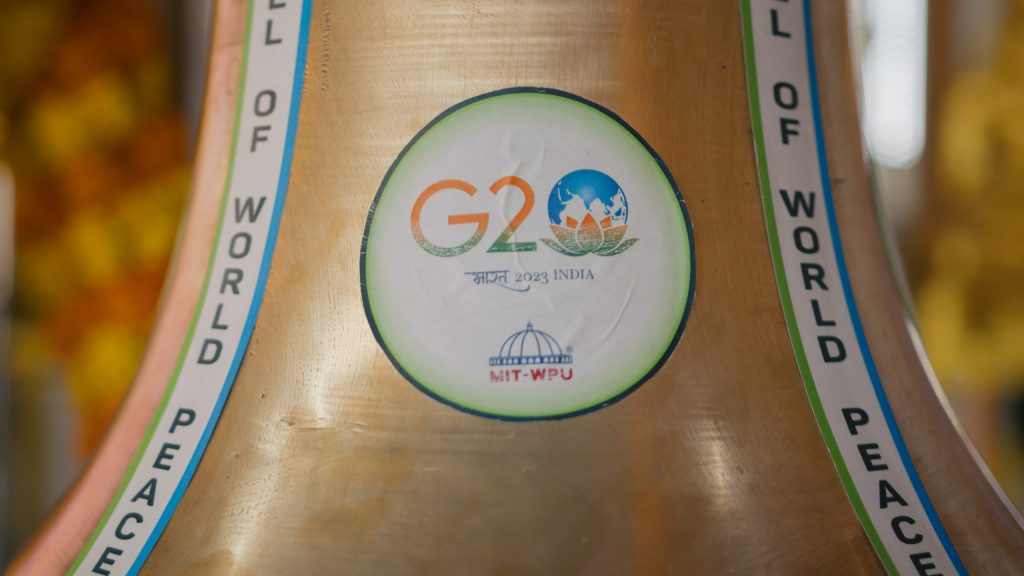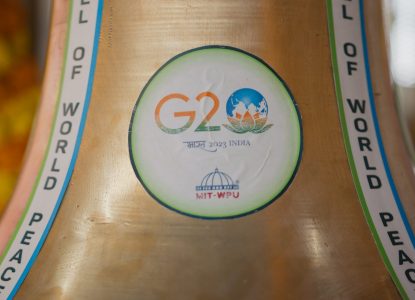By W. Cole Durham Jr. and Katherine Marshall, IF20
This letter was sent to G20 Leaders prior to the G20 India Summit in September 2023.
– – –

“Vasudhaiva Kutumbakam”, or “One Earth, One Family, One Future”, the overarching 2023 G20 theme set by the Government of India, encapsulates the complex and deeply interconnected challenges and hopes that face world leaders and their invited guests when they meet in New Delhi for the September Summit. Extraordinary demands confront them: economic and financial perils, raging conflicts and, linked to them, over 110 million people forced to move, mounting pressures to mobilize the finance needed to address climate change, urgent agendas on health and education, political and social tensions, and many others.
Facing these formidable agendas, the G20 Interfaith Forum highlights two critical anchors to action:
- To focus first and foremost on those who are most vulnerable, most affected by today’s intertwined crises;
- To keep a constant eye on the impact of each action on children.
This appeal reflects the common and deeply held values of diverse religious traditions which call for compassion as a lodestar for action to benefit a common humanity and a vision towards the future, exemplified in the welfare of children.
Four Broad Agendas (The 4 C’s)
Specific proposals for action draw on IF20 discussions in New Delhi, Abu Dhabi, and different world regions. They focus on four broad agendas, inspired by the demands of this Kairos moment, a time of critical demands and grace:
- The extraordinary COVID-19 global crisis demands a common framework for action that addresses health system weaknesses and inequalities and preparedness for future pandemics; both involve religious communities and the assets they bring.
- Contemporary conflicts have multiple causes, religious factors among them, and peacebuilding benefits when interreligious and religious actors are involved. The deeply worrying plight of some 110 million forced migrants is intricately linked in both causes and the search for solutions.
- The climate crisis demands both extraordinary leadership and public mobilization, both instances where faith communities play vital roles.
- And world leaders, secular and religious, political and private sector, need urgently to gauge the impact of crises on children’s welfare.
Overarching Concerns
Three overarching concerns follow from the “four Cs” agenda:
- A concern that action on international financial architecture is urgently needed, starting with addressing pressing country indebtedness and the capacity of multilateral institutions to support the Sustainable Development Goal (SDG) agendas and humanitarian needs as well as continuing efforts to combat corrupt practices.
- Attention to the poorest nations is central to the G20 agenda. The IF20 thus supports the proposal to include the African Union as a G20 member.
- The G20 members carry special responsibilities to lead in redressing patterns underlying inequalities, and the IF20 urges serious consideration of its proposal for a Commission to address racism.

Paths to Action
The G20 Interfaith Forum has focused in 2023 on specific areas for action that follow from the broad agenda inspired by the four C’s. More detailed policy briefs supporting many of these points are available at https://www.g20interfaith.org/if20-policy-briefs/.
- The COVID-19 crisis highlighted urgent gaps in politics and approaches to children’s welfare, both those in vulnerable situations (refugees, marginalized communities and people, and well beyond.) Child sexual abuse and exploitation is one of the biggest threats to children, and the family can play a critical role in their well-being. Mental health merits concerted action. In action on digital challenges, the impact on children needs special attention at international, national, and community levels.
- Climate: With climate and environmental issues pressing forcefully on global agendas, G20 leaders need to take specific and bold action to address bottlenecks to action and galvanize tangible progress. Priority areas within the G20 mandate are climate finance and energy transitions. G20 leadership can and should also offer inspiration and practical guidance on the innovative cross sector engagement that can galvanize faster action. A promising example is the Interfaith Rainforest Initiative that engages religious leaders, governments, multilateral institutions, and local communities to protect tropical rainforests in the Amazon, Congo, and Southeast Asia basins. Support for IRI from G20 leaders could both advance action and highlight the potential for similar engagement.
- Conflict and forced migration. World religious communities are primary actors in addressing conflicts and its profound disruptive effects on so many communities. IF20 urges G20 countries to be actively involved in seeking peace worldwide. These efforts can benefit from active efforts to work with religious communities.
- With the COVID-19 emergencies largely behind us, G20 leaders and nations need to engage religious communities in concrete reflections on lessons learned. Focusing on health systems with a view towards filling gaps and greater equity is a high priority. With near certainty of future pandemics, engaging religious communities in work for preparedness is an urgent matter.
- Massive disruption of formal education by the COVID-19 emergencies demands urgent measures that go beyond a “return to normal.” G20 leaders can press nations to take the opportunities to address growing educational disparities among communities, and gaps in civic education that weaken society and accentuate polarization. The IF20 calls for active dialogue about the needs of youth and children, drawing on actionable proposals for inclusive planning in education, with trauma-informed approaches that draw on faith-inspired and indigenous traditions.
Education holds the key to making progress in each of the foregoing areas. There is a need for global coordination of interfaith educational efforts through a global body, consortium, or some other appropriate agency. The World Peace Dome, where the culminating session of the 2023 G20 Interfaith Forum was held, would be pleased to provide a venue for pursuits along these lines.
– – –
Prof. W. Cole Durham, Jr., is the President of the G20 Interfaith Forum Association, the immediate past President of the International Consortium for Law and Religion Studies(ICLARS), and Susa Young Gates University Professor of Law and Founding Director of the International Center for Law and Religion Studies (ICLRS), at the J. Reuben Clark Law School of Brigham Young University. He is a graduate of Harvard College and Harvard Law School, and is a founding Editor-in-Chief of the Oxford Journal of Law and Religion.
Professor Katherine Marshall is a senior fellow at the Berkley Center for Religion, Peace, and World Affairs at Georgetown University. She serves as the vice president of the G20 Interfaith Association and executive director of the World Faiths Development Dialogue, and worked at the World Bank from 1971 to 2006, tackling development issues in the world’s poorest countries.


